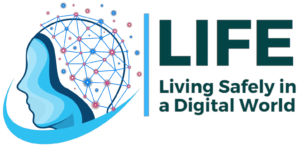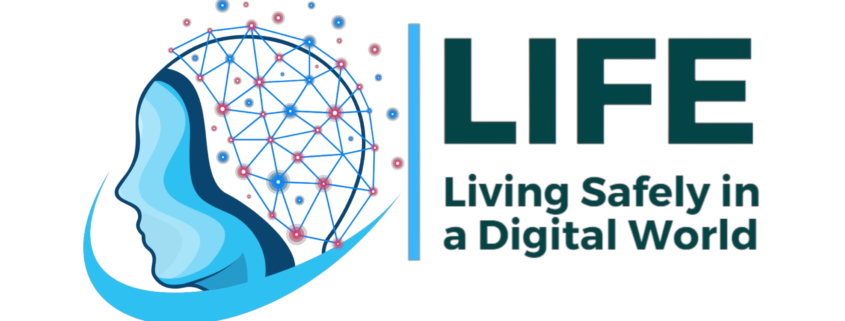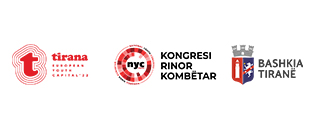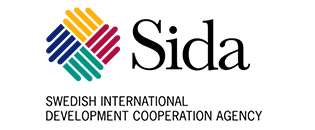LIFE-Living Safely in a Digital World
The project “Living Safely in a Digital World” (acronym: LIFE) will be implemented during 2 years (November 1, 2023 – October 31, 2025).
LIFE project consortium team is led by AMAD (Albania) in the role of the coordinator, YES (Bulgaria), Beyond Borders (Italy), KOM018 (Serbia), and Euromed Eve Tunisia (Tunisia).
The aim of LIFE project, proposed by this consortium is to increase the resilience of the young generation on facing the risks of the digitalization and its impact in their everyday life through empowering youth organizations to be involved in policy dialogue and use non-formal learning in their work with the young people.
The objectives of LIFE are: 1. Enabling youth organizations to cooperate in inter/national level and “speak up” on behalf of young people, advocating to decision-makers for a safe internet that impacts their lives
2. Empowering youth workers with the necessary skills to support the young generation on their struggles to the digitalization of life through non-formal learning
3. Raising awareness on the impact of digitalization in the young people’s lives and how to work toward increased resilience
These objectives would be achieved through the following steps:
• Establishment of a reporting platform on the risks of internet use, such as hate speech, cyber bullying etc. The platform will serve to all the partners to monitor the situation on their own countries and then denounce it. These complaints will every year be gathered in a report format and will be presented to the responsible national institutions, trying to engage policymakers in the process, for them to engage further in the protection of the future (young generation) while the digital technology is changing the lifestyle and life perceptions. This will also empower the partners as they will increase their communication with the policymakers regarding the youth policies. A comparative report will be prepared to analyse the situation in the consortium countries.
• Building the capacities of youth workers regarding the safe internet, hate speech, cyber bullying, media literacy through transnational trainings, as well as strengthening their capacities through job shadowing process in the partner organizations. Non-formal education will be very important during the training, especially for youth workers. During these trainings, youth workers will also provide ideas of change, proposing change projects that can be implemented in their own countries to engage youth and to increase resilience on the risks of internet. These change projects will be important for the young community but also youth workers themselves to put in practice what they’ve learned and serve as change agents.
• Raising awareness through internet and face-to-face activities on the safe internet, increasing media literacy, facing hate speech and cyber bullying. This will be done through innovative ways, such as TEDx talks, while engaging all the important stakeholders, that include: parents, teachers, social workers, policy-makers, private sector etc. These TEDx talks will be organized and then shared online for the community. Short movies will be prepared and published by the project to raise awareness of the young generation as well as world cafes, where the participation of the youth will be required.

The project contributes to the following thematic areas/specific objectives of the call:
• Political participation, civic engagement and dialogue with decision-makers
• Inclusion of young people with fewer opportunities
• Antidiscrimination and gender equality
• Digital and entrepreneurial skills
It also contributes to the call objectives:
• Promote non-formal learning activities in third countries not associated to the programme, especially targeting young people with fewer opportunities, with a view to improving the level of competences while ensuring the active participation of young people in society: LIFE will use non-formal learning to increase the capacities of youth workers of the consortium and will focus on the young people with fewer opportunities (the ones that are victims of hate speech, cyber bullying, suffering from mental health problems etc.)
• Contribute to the implementation of the EU Youth Strategy (2019-2027) including the 11 European Youth goals and the Youth Action Plan in the EU External Action – LIFE will focus on inclusion, anti-discrimination and mental health when concerning European Youth Goals.
• Foster cooperation across different regions of the world through joint initiatives – the consortium of LIFE includes youth organizations from Albania, Serbia, Bulgaria, Italy and Tunisia, having a cooperation from very different regions of the globe
LIFE will contribute to the horizontal priorities:
- Environmental sustainability: Though LIFE is not directly engaged in the environment, its focus is on internet, which is also an important polluter of the environment. As such, the organizations have discussed about using safe methods and increasing the awareness of people on the effects that internet has even in the environmental aspect and how it affects the environmental sustainability. During the production of the project materials, the management team will discuss with the web-developers (ITs) to use the best ways on safe environment.
- Inclusion and Diversity: This priority is very important throughout LIFE as it will focus on inclusion of different people and will focus on young people with fewer opportunities. While the internet gives all the priority to be included, it also can be used on the opposite: to exclude others. Promoting diversity and inclusion will be an important part of the project which will be part of the capacity building activities, such as transnational trainings, change project, as well as the awareness campaign.
- Digital dimension: As LIFE is focused on safe internet, the digital dimension is of course its target. Digital skills will be important during the project life for the youth workers as well as the youth in general. The consortium will prepare and use the internet to improve the links between people. Also, in the involvement and capacity building activities of youth workers and youth NGOs, the European Youth Portal and European Youth strategy Platform will be used as important “links” of the youth community.
- Common values, civic engagement and participation: Critical thinking and media literacy are important in this project. The youth workers will increase their capacities on “reading” internet, improving their understanding and also having a safe approach toward internet and all its benefits. It will be important for this project to enable young people to understand the negative and positive effects of the internet and how to protect themselves, and increasing media literacy among them is one of the best approaches.






